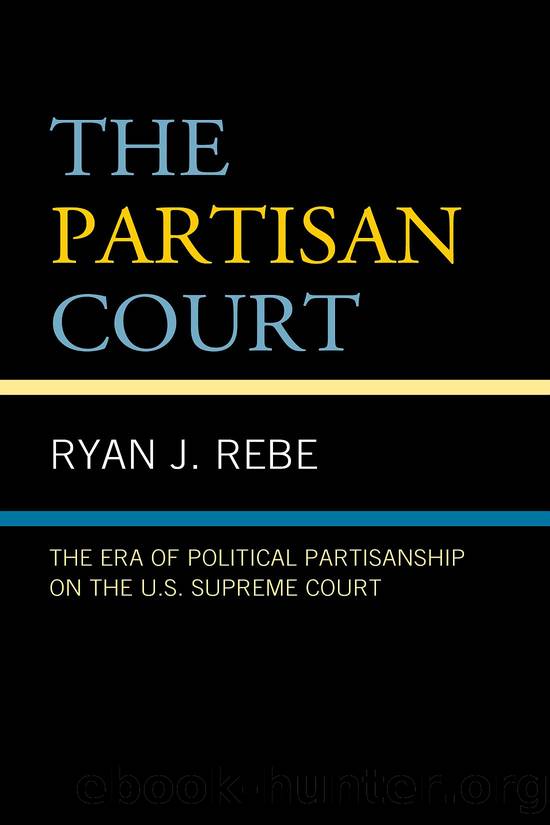The Partisan Court: The Era of Political Partisanship on the U.S. Supreme Court by Ryan J Rebe

Author:Ryan J Rebe [Rebe, Ryan J]
Language: eng
Format: epub
Tags: Law, government, Federal, Political Science, History & Theory, American Government, Judicial Branch
ISBN: 9781793611345
Google: L99CEAAAQBAJ
Publisher: RowmanLittlefield
Published: 2021-10-11T22:13:33+00:00
Chapter 8
Citizens United v. Federal Election Commission (2010)
Arguably the most controversial decision of the past twenty years, Citizens United stands as a testament to the willingness of Supreme Court justices to disregard statutes and even their own precedent when partisan interests are at stake.1 Under the Federal Election Campaign Act of 1971 (FECA), Congress banned corporations and unions from using general treasury funds to make independent expenditures expressly advocating for the election or defeat of a candidate.2 FECA, 2 U.S.C. § 441b prohibited contributions or expenditures by corporations or labor organizations in connection with federal elections.3 Subsequently, Congress passed § 203 of the Bipartisan Campaign Reform Act of 2002 (BCRA), that amended FECA to include a ban on corporations and unions using general treasury funds for electioneering communications (Section 203 was codified as part of 2 U.S.C. § 441b).4 These statutes were part of a long-standing tradition dating back to the Tillman Act of 1907,5 which banned corporations from making monetary contributions in connection with any election for political office, and the Federal Corrupt Practices Act of 1925, which expanded the ban on corporations beyond money contributions to include âanything of value.â6 Congress enacted these statutes in recognition of the corrupting influence corporations have over elected officials.
The Supreme Court respected Congressâ prerogatives in this area for over a century. In Austin v. Michigan Chamber of Commerce (1990), the court held that Congress may ban political speech based on the speakerâs corporate identity.7 Subsequently, in McConnell v. Federal Election Commission (2003), the court upheld limits on electioneering communications.8 The Citizens United decision marked an abrupt shift in the courtâs First Amendment jurisprudence when it came to campaign finance law and essentially overturned the key parts of Austin and McConnell.
The corporation at the center of this case, Citizens United, posed as a nonprofit advocacy group. In reality, it was an extension of the Republican Party. Citizens Unitedâs president, David Bossie, was a regular Fox News contributor and an eventual Deputy Campaign Manager for President Trumpâs 2016 campaign. He worked as a Republican political operative for decades. The justices must have been aware of this at the time, and yet, Justice Kennedyâs opinion didnât mention the corporationâs partisan leanings a single time.
Citizens United produced a film called Hillary: The Movie, a ninety-minute âdocumentaryâ highly critical of Hillary Clinton, who was the favorite at the time to win the 2008 presidential nomination of the Democratic Party. The film was basically a ninety-minute political commercial advocating against Hillary Clinton. The release of the film in January 2008, was obviously timed to coincide with the start of primary season. It was released in theaters and on DVD, but Citizens United also wanted to release it on video-on-demand free of charge. Citizens United was concerned that its film would violate federal elections laws, since it would be an electioneering communication released for free within thirty days of a primary. Thus, it sought declaratory and injunctive relief against the FEC in federal district court. Citizens United wanted to
Download
This site does not store any files on its server. We only index and link to content provided by other sites. Please contact the content providers to delete copyright contents if any and email us, we'll remove relevant links or contents immediately.
| Antitrust | Civil Law |
| Emigration & Immigration | Federal Jurisdiction |
| Housing & Urban Development | Indigenous Peoples |
| Land Use | Public |
| Public Contract | Public Utilities |
| Urban, State & Local Government |
Machine Learning at Scale with H2O by Gregory Keys | David Whiting(4280)
Killers of the Flower Moon by David Grann(4022)
Oathbringer (The Stormlight Archive, Book 3) by Brandon Sanderson(3108)
Will by Will Smith(2891)
Once Upon a Broken Heart by Stephanie Garber(2817)
Guns, Germs and Steel by Diamond Jared(2350)
It Starts With Us (It Ends with Us #2) by Colleen Hoover(2317)
Borders by unknow(2297)
Friends, Lovers, and the Big Terrible Thing by Matthew Perry(2208)
The Room Where It Happened by John Bolton;(2140)
The Color of Law by Richard Rothstein(1912)
The Strength In Our Scars by Bianca Sparacino(1828)
HBR's 10 Must Reads 2022 by Harvard Business Review(1828)
A Short History of War by Jeremy Black(1827)
A Game of Thrones (The Illustrated Edition) by George R. R. Martin(1691)
Water Rights and the Environment in the United States by John Burch(1670)
515945210 by Unknown(1653)
Examples & Explanations: Administrative Law by William F. Funk & Richard H. Seamon(1628)
That Every Man Be Armed by Stephen P. Halbrook(1569)
